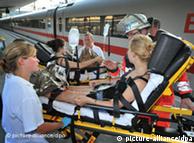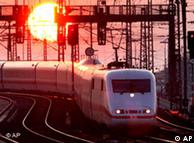
'USA Today' announced plans to focus more on its digital platforms, and indicated it will lay off some 130 employees.
About 130 employees of USA Today, the second-largest newspaper in the U.S., will lose their jobs this fall, its parent company said today:
"USA TODAY has announced a major organizational restructuring with the creation of new departments as well as key appointments in the departments of circulation, finance and news," Gannett said in a statement.
The press releases, which heralds the creation of several new executive positions, does not explicitly mention the layoffs. In an interview with The Associated Press, Dave Hunke, the newspaper's publisher, said that the shake-up is "pretty radical."
Executives presented the plan to employees yesterday. NPR's David Folkenflik said it began with a quotation from William Edwards Deming, the management guru:
It is not necessary to change. Survival is not mandatory.
USA Today will focus more attention and resources on digital products, including its iPhone and iPad applications, and a new "content group" will collaborate with Rudd Davis, its vice president of business development.
"Davis, the founder of sports website BNQT.com, is being brought in to oversee new business opportunities and brand licensing among other things," the AP reports. "BNQT, which focuses on sports such as skateboarding and skiing that appeal to younger audiences, was bought by Gannett in 2007."
Like many newspapers, USA Today has been losing revenue. In the last three years, it has lost almost 500,000 subscribers.
------
customization
By MATTHEW DOLAN
OAKVILLE, Ontario—The auto industry is getting fired up about wireless technology in cars and trucks but it's not just for connecting passengers' laptops or streaming Internet radio stations.
Here at an assembly plant outside Toronto,Ford Motor Co. is using Wi-Fi transmitters to load customized phone and entertainment features into its Edge and Lincoln MKX crossovers as the vehicles chug down the production line.
The Dearborn, Mich., company is beaming software wirelessly to the vehicles to set up their information and entertainment systems for various markets: One Edge bound for the U.S. gets Ford's 911 emergency assistance package while one to stay in Canada gets the option to speak in French and offers traffic information about Canadian roads.
Ford's coming Explorer sport-utility vehicle and Focus compact car will have similar technology when they launch later this year.
But transmitting software for radio and phone systems may be just the start of the customization possibilities at car factories and dealerships. Cars could be programmed wirelessly for individualized options ranging from power-seat preferences to how quickly the transmission shifts gears—all without the auto maker having to spend money on variations of the same parts.
"Auto makers always wanted customization but they didn't want to pay for it," said Ronald Harbour, an expert on auto manufacturing for the management consulting firm Oliver Wyman.
These tailored cars could attract a new generation of buyers who want to pre-order their cars rather than pick a prefabricated one off the dealer's lot. Much like people personalize their iPad or Android phone with "apps," car buyers could select an apps package for their new vehicle.
These features could be loaded into cars or turned on at the dealer or even in the owner's driveway, depending on which options a customer decides to pay for, according to a former Ford executive.
Such a setup could answer an important riddle for auto makers: How to reduce the number of uniquely assembled vehicles to save money even as they offer customers vehicles that are as personalized their smartphones.
Beginning at the Oakville plant, Ford expects to save millions of dollars by using a common though programmable electronic part to make available more than 90 options.
The production-line Wi-Fi innovation aids the company's plans to expand its voice-activated system, originally known as SYNC and now incorporated into an expanded MyFord Touch interface, around the world.
The system is based on a Wi-Fi device that Ford built into the vehicles for another purpose: to provide Wi-Fi "hotspots" in the cars so passengers using laptops or other devices can tap into the Internet while on the road. To use their vehicles to provide mobile Web connections, owners with Wi-Fi equipped cars need to buy a USB broadband card.
"To be honest, we did not have this in mind" when Ford designed Wi-Fi for its vehicles, said Sukhwinder Wadhwa, global platform manager for SYNC. The assembly-line application came after Ford discovered that the expense of creating dozens of different entertainment and information modules was cost-prohibitive.
The installation process in the Oakville plant is hands-free, reducing labor costs without slowing assembly-line speed, company officials said. So far, the error rate in loading the software is less than 1%, said Mr. Wadhwa.
Several other car makers plan to offer Wi-Fi hotspots in their vehicles, including General Motors Co., Chrysler Group LLC and Volkswagen AG. But so far, none are using the technology to customize their products in the plant as Ford now does.
"The industry is moving toward using Internet access to integrate all of the technology in the car and keep it fresh," said Christine Williams, of Autonet Mobile, which supplies GM, Chrysler, VW and Subaru, the Japanese brand made by Fuji Heavy Industries Ltd.
Some auto makers remain cautious, citing tepid consumer demand and a worry over safety issues. "As entertainment technology expands it becomes increasingly important to manage distractions that can occur when operating vehicle entertainment systems," Toyota Motor Corp. spokeswoman Mona Richard said in an email. Toyota and its luxury Lexus brand don't offer factory-installed Wi-Fi.
Such systems do pose challenges: Vehicles with Wi-Fi risk opening up a car's electronics to hackers and the like. "Once you open up a car to be provisioned, everyone is going to try to break in," said David McNamara, an automotive consultant and former Ford researcher. "That's why infotainment's first. The risk of a virus there is not something that could affect the entire vehicle."
And unlike a ding in the sheet metal, customization of electronics might be susceptible to errors unseen until, say, a buyer in the U.S. ends up with a car that suddenly starts displaying maps in Mandarin. Ford officials said they have quality checks inside the plant that would reveal any such defect.
--該公司稱﹐此次召回將涉及2005-2008年生產的卡羅拉和Corolla Matrix車型。該公司表示﹐據稱有三起未經證實的車禍與上述問題有關﹐其中一起車禍造成車主受輕傷。
豐田汽車公司週四表示﹐作為召回計劃的一部分﹐將免費為車主更換召回車輛的引擎控制模塊。
TRANSPORTATION | 29.08.2010
German rail operator compensates victims of train air conditioning failure
German rail operator Deutsche Bahn has so far paid out 2.7 million euros ($3.5 million) to passengers affected by air conditioning failures on its high-speed trains.
A heat-wave in July exceeded the capabilities of the air-conditioning units on Inter-City Express (ICE) trains. Temperatures inside the trains were above 32 degrees Celsius (89 degrees Fahrenheit), causing some passengers to be hospitalized to due dehydration and the extreme heat.
 The heat in the trains sent some passengers to the hospital
The heat in the trains sent some passengers to the hospital
A spokesperson for Deutsche Bahn said 23,000 passengers have so far received compensation, with more applications waiting to be processed.
The pay-outs vary according to a passenger's degree of suffering on board the overheated trains, with some receiving free travel vouchers or 500 euros in cash.
The Pro-Bahn passenger lobby group welcomed the payments. The organization's head, Karl-Peter Naumann, told the daily Hamburger Abendblatt that the rail operator was acting in a sensible way and that he was not aware of complaints about delayed payments.
Author: Matt Zuvela (Reuters/dpa)
Editor: Sean Sinico




沒有留言:
張貼留言